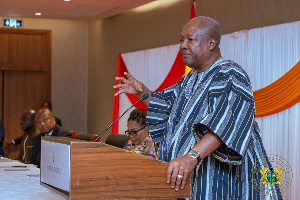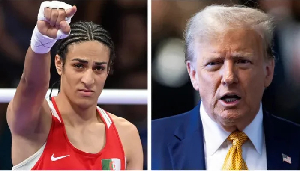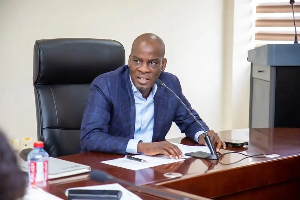The Ghana Investment Promotion Centre (GIPC) officials have met with the Finance Minister, Ken Ofori-Atta, to seek a review of the tax retention policy captured in the 2017 budget and economic policy statement of government.
The policy, requires all companies, including importers, who qualify for tax and duty exemptions to pay their taxes upfront to be refunded in 30days.
Chief Executive Officer of the Ghana Investment Promotion Centre (GIPC), Yofi Grant, speaking at a meeting with the members of the American Chamber of Commerce in Accra said the policy needs a rethink hence the high-level meeting.
“I must say here that, a recent policy or statement that came out of the budget presentation that makes things difficult at the ports and for businesses is the tax retention, where companies are being asked to pay taxes upfront to be refunded in 30days. We have had a big meeting about it, and the conclusion was that it was a bit of a difficulty because if you are business and you came into Ghana with a net worth of about US$500 million and you have to pay these taxes to be refunded to you later, it could be a major cashflow issue. And it will also significantly and negatively impact on your business. So, we need to look at it and take it off.”
The high-level meeting comes on the heels of a March 21, 2017 letter from the Ghana Revenue Authority (GRA), signed by Commissioner Kuudamnuru John Vianney of the Customs Division, to all ports stations in the country, directing the implementation of the policy as captured in the budget and approved by Parliament.
The letter sighted by the B&FT states that: “The government had put in a policy that requires all applicants who qualify for exemption from import duties and taxes to make prior payments and then make a claim for a refund of the amount paid.”
The letter further directed the tax officials to immediately implement the policy, adding: “You are therefore to ensure strict adherence to the policy and report any problems for redress”.
Mr. Grant stressed the need for government to do more to make Ghana the investment hub and the first choice for any person thinking of investing in Africa.
“We also have to take off taxes on raw material for production, but before we do that, we need to clearly define what production and manufacturing is. That will let us know exactly who qualifies for these tax exemptions,” he said.
He was also of the view that; the business community will have to interact more with government in finding solutions to existing challenges and creating an enabling environment for businesses to thrive.
“There are still a lot of things that we ought to do, if we want to become an investment attractive country. Now, why the sudden real focus on investments? For those of you who have studied and followed the economy quiet closely. We inherited an economy that had a major fiscal challenge, because all our revenues were eaten up by recurrent expenditure, and so the government really has no fiscal space as we speak to do any development. But the government’s purpose is to create an environment where the people are happy by attracting investments,” Mr. Grant said.
Business News of Wednesday, 5 April 2017
Source: thebftonline.com













